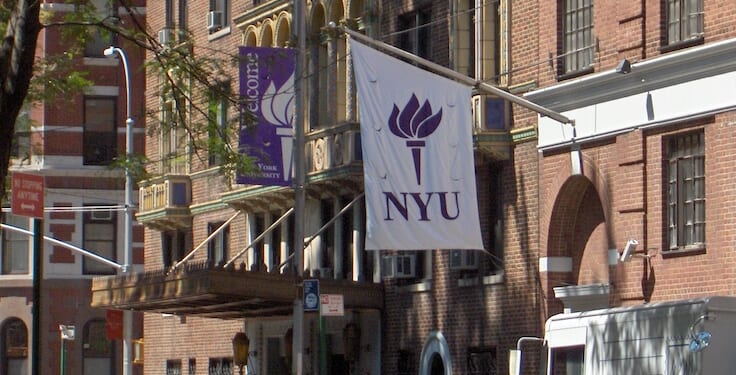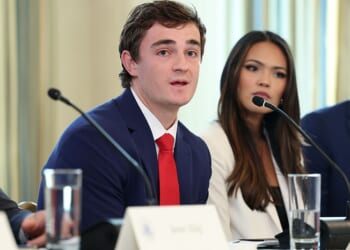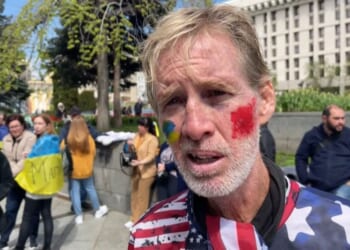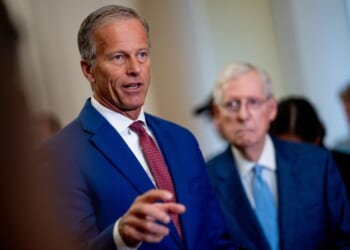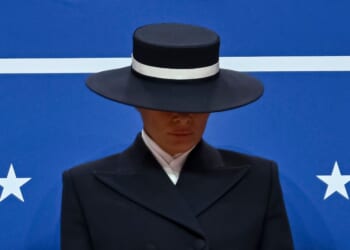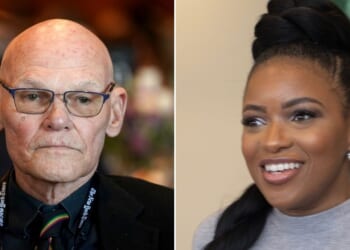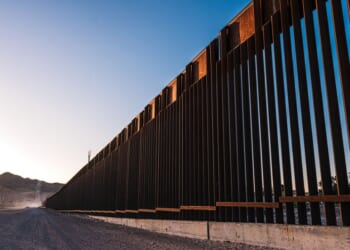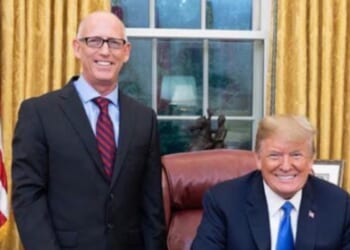New York University Law School appears to have canceled a Federalist Society event scheduled for Oct. 7 because administrators feared that protesters would disrupt it, according to two people familiar with the matter and emails obtained by the Washington Free Beacon. The cancellation has raised concerns about the heckler’s veto and comes as the White House anti-Semitism task force has vowed to investigate NYU, which last year settled a lawsuit alleging that the university failed to crack down on unsanctioned anti-Israel protests.
NYU’s Federalist Society chapter had invited the conservative legal scholar Ilya Shapiro to discuss his new book Lawless: The Miseducation of American Elites. Shapiro, who is Jewish, has criticized anti-Israel protesters and taken schools to task over their handling of encampments. He has also been the target of multiple campus protests, including one at UC Hastings, where he was shouted down for nearly an hour straight.
On September 10, NYU requested that the Federalist Society change the date of Shapiro’s talk, citing the possibility of disruptions.
“For security reasons, and because we anticipate an increased likelihood of demonstrations and protests connected to the anniversary of the October 7, 2023 incidents in Gaza, would it be possible to host Mr. Shapiro on another date?” the law school’s director of institutional programming and governance, Penelope Fernandes, wrote to student organizers. “If you can change the date, please let us know.”
Fernandes also recommended hosting the talk in Lipton Hall, a basement space with added security, in order to “minimize disruptions in the event of a protest or demonstration.”
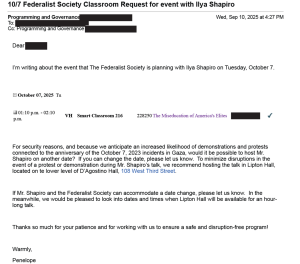
The student organizers agreed to move the location of the talk but said that Shapiro was only available on Oct. 7. Besides, they wrote in an email, “we all feel strongly that we should host the event on October 7 to avoid giving in to the heckler’s veto.”
But one week later, Fernandes told the students that they could not host Shapiro that day at all. Pressed for more details about the cancellation, another administrator, associate dean Megan McDermott, confirmed that security concerns were a major factor, writing in an email that the school’s security personnel would be strained that week.
“After a review of the already great demands on resources and personnel (including but certainly not limited to security personnel) during the week of October 6-10, 2025, I personally made the decision that we could not host your event on campus during that week,” McDermott wrote. “This is not a decision based on the proposed program or speaker but rather based on an obligation to provide enhanced security generally on campus during that week as well as resource commitments we have already made across multiple buildings for public and closed events during the same period.”
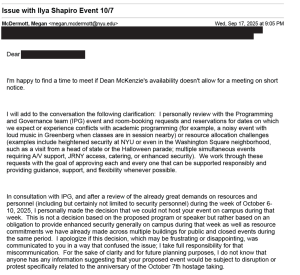
Lawless argues that “institutional weakness” has created a climate of illiberalism at law schools, with spineless administrators courting radicalism and refusing to expel students who disrupt events. The irony was not lost on Shapiro, the director of constitutional studies at the Manhattan Institute, who said the decision to cancel his talk vindicates the thesis of his book.
“There could not be a more on-the-nose example of weak university officials in the face of a heckler’s veto than this farce,” Shapiro told the Free Beacon. “I’d be happy to give NYU’s dean a copy of my book so he can ‘do the work’ of learning how to be an effective and principled leader.”
A spokesman for the law school, Michael Orey, claimed that NYU “did not cancel” the event, but simply “requested that the Federalist Society find another date on which to invite Mr. Shapiro.” In fact, the talk is now listed as “cancelled” in NYU’s event management system.

The dean of the law school, Troy McKenzie, did not respond to a request for comment.
As the Trump administration continues its crusade against elite academia, universities have responded by tamping down on the anti-Israel protests that derailed campus life amid the Israel-Gaza war. The emails from NYU officials show how the threat of disruption is still impacting rule-abiding student groups and raises serious questions about how NYU, which has faced multiple anti-Semitism complaints since 2019, approves speakers, given limited resources.
The law school claimed that it could not accommodate Shapiro, an outspoken Zionist and critic of diversity programs, for an hour-long lunch talk on October 7. But it is slated to host a seven-hour symposium on “social entrepreneurship, impact investing, and sustainable development” that same day.
Speakers will include Baruch College’s Nizan Geslevich Packin, who has called on banks to advance the “DEI social agenda,” and the University of Missouri’s Evan Absher, who helps design “inclusive entrepreneurial ecosystems.”
Sensing a double standard, members of the Federalist Society requested a meeting with NYU law dean Troy McKenzie. At the meeting, which took place on September 24, McKenzie contradicted his subordinates and claimed that the cancellation had nothing to do with the threat of protests, two people present for the meeting said.
He went on to reference a “private event” that would require every member of his office to be on deck. With the event staff preoccupied, McKenzie said, the law school would not be hosting any outside speakers the week of October 7.
In fact, the law school’s public events calendar lists at least four events with outside speakers scheduled for that week. One of those events, a talk on class action lawsuits in the wake of Trump v. CASA, has been organized by the Federalist Society and approved without incident.
McKenzie could not explain why the law school had greenlit those talks, according to the students at the meeting. And he refused to specify the nature of the private event that precluded outside speakers, though a person familiar with the matter said a trustees meeting had been scheduled for that week.
“It felt like he was making it up as he went along,” one student in the meeting with the dean said.
Since then, the explanations have continued to shift. Asked about the meeting with McKenzie, Orey, the law school spokesman, denied that administrators told the students that outside speakers were not welcome the week of Oct. 7. The law school, he said, had simply run out of space to accommodate Shapiro.
“There are a limited number of events that we have the capacity to support responsibly, particularly during periods of heavy demand or other constraints on staffing or space,” Orey told the Free Beacon. “It is not true that the Law School claimed that outside speakers were not welcome during the week of October 6-10; the students from the Federalist Society are certainly aware of this as they plan to host another outside speaker that same week.”
But the Federalist Society had requested to host that speaker, Ted Frank, two weeks after it had filled out the paperwork for Shapiro, according to emails reviewed by the Free Beacon. Since events are typically approved on a rolling basis, a student organizer said, any resource constraints should have precluded Frank’s talk instead of Shapiro’s. Orey did not respond to follow-up questions about the timeline.
Thus far, NYU has not faced the same wrath as Columbia or Harvard, which lost billions in federal funding amid the Trump administration’s crackdown on universities. It was, however, one of the first 10 schools targeted by the White House anti-Semitism task force in February of this year. And the university has been dogged by allegations of bias ever since the Education Department launched a probe of the school during the first Trump administration, resulting in a settlement agreement that saw NYU adopt a more expansive definition of anti-Semitism.
The university also reached a separate settlement last year with Jewish students who were allegedly harassed in the wake of Oct. 7. The Education Department, meanwhile, is investigating NYU for its alleged use of racial preferences, though the agency has conducted no further probes of the school related to anti-Semitism.
In 2023, the university was hit with a federal civil rights complaint over a whites-only “anti-racism” workshop it hosted for public school parents. Facilitators at the workshop, which cost $360 to attend, said it was a space to talk about racism without “burdening the people of color in our lives.”

